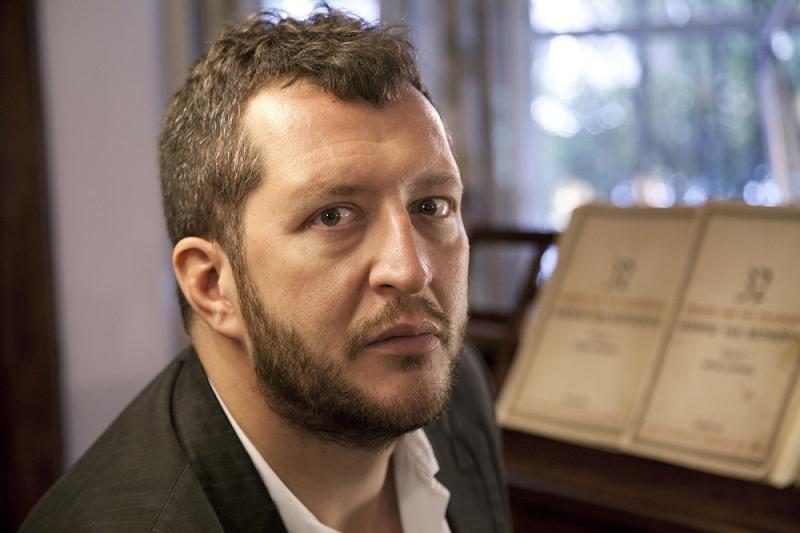Britten Sinfonia, Adès, Milton Court | reviews, news & interviews
Britten Sinfonia, Adès, Milton Court
Britten Sinfonia, Adès, Milton Court
Adès and co bring vibrant humour and bold originality to Beethoven and Barry

Thomas Adès and the Britten Sinfonia are embarking on a three-year project, coupling the symphonies of Beethoven with works by contemporary Irish composer Gerald Barry. Adès is keen to highlight the radical vision of the two composers, so expect stark juxtapositions and uncompromising readings.
Opening the cycle with Beethoven’s Septet, Op. 20, suggests a path from the conventional to the revolutionary. But this early, elegant and classically formal work inspired some beautiful playing from the reduced Britten Sinfonia. Most of the movements are based on dance forms, expressed here with light and buoyant rhythms, the phrasing supple but always measured. Beethoven employs three winds and four strings, but the solo violin is the dominant voice throughout, and Thomas Gould rose to the occasion, his nimble fingerwork and varied, sprightly tone setting the mood and unifying the mixed ensemble.
 Thomas Adès was joined by Gerald Barry himself (pictured left) for Five Chorales from The Intelligence Park, a two-piano arrangement of excepts from his opera from the mid-1980s. The work was an ideal taster for the larger Barry scores ahead, a series of short movements, each presenting a single idea, and letting it play out to an indeterminate length, before stopping abruptly without development or elaboration. Hearing these experts just a few weeks after Adès’s The Exterminating Angel at Covent Garden, it is easy to understand the affinity between the two composers. Both write in bold, uncompromising styles, with incisive rhythmic patterns and biting, though rarely aggressive, dissonances. They project a similar humour too, a Ligeti-like tendency to the absurd, with hectoring rhythmic ideas gradually spinning out of control and then stopping at a seemingly random point. The two composers gave a spirited reading, suitably percussive throughout. There seemed to be a few moments of poor co-ordination between the pianos, but I can’t swear that it isn’t written into the score.
Thomas Adès was joined by Gerald Barry himself (pictured left) for Five Chorales from The Intelligence Park, a two-piano arrangement of excepts from his opera from the mid-1980s. The work was an ideal taster for the larger Barry scores ahead, a series of short movements, each presenting a single idea, and letting it play out to an indeterminate length, before stopping abruptly without development or elaboration. Hearing these experts just a few weeks after Adès’s The Exterminating Angel at Covent Garden, it is easy to understand the affinity between the two composers. Both write in bold, uncompromising styles, with incisive rhythmic patterns and biting, though rarely aggressive, dissonances. They project a similar humour too, a Ligeti-like tendency to the absurd, with hectoring rhythmic ideas gradually spinning out of control and then stopping at a seemingly random point. The two composers gave a spirited reading, suitably percussive throughout. There seemed to be a few moments of poor co-ordination between the pianos, but I can’t swear that it isn’t written into the score.
When the Beethoven Op. 70 No. 2 Piano Trio began in the second half, it seemed that the Barry was still at the forefront of Adès’s mind. The difference between the early period Beethoven of the Septet and the middle period of the Piano Trio could hardly have been more marked. Formal principles were here subsumed into a nebulous world of unpredictable and impulsive expressions. Themes would appear, and sing out, but then return into the evolving textures from which they had come. There was plenty of lyricism, especially from violinist Thomas Gould and cellist Caroline Dearnley, but the melodies were always presented as part of a more complex textural argument. The first movement ended with complete surprise, just as in the Barry, and the variations in the second movement seemed to float free of any grounding structural principles.
There were a few flaws: Adès was heavy-handed in the quiet introduction to the first movement, and in the finale seemed intent on making bold thematic statements, even at the expense of balance and continuity of line. But that boldness was the defining feature of this performance. It augers well for the symphony cycle, which begins at the Barbican on Friday, also broadcast live on BBC Radio 3. Tune in for fresh and subtly iconoclastic readings, with vitality, humour and plenty of surprises along the way.
rating
Share this article
The future of Arts Journalism
You can stop theartsdesk.com closing!
We urgently need financing to survive. Our fundraising drive has thus far raised £49,000 but we need to reach £100,000 or we will be forced to close. Please contribute here: https://gofund.me/c3f6033d
And if you can forward this information to anyone who might assist, we’d be grateful.

Subscribe to theartsdesk.com
Thank you for continuing to read our work on theartsdesk.com. For unlimited access to every article in its entirety, including our archive of more than 15,000 pieces, we're asking for £5 per month or £40 per year. We feel it's a very good deal, and hope you do too.
To take a subscription now simply click here.
And if you're looking for that extra gift for a friend or family member, why not treat them to a theartsdesk.com gift subscription?
more Classical music
 Classical CDs: Bells, birdsong and braggadocio
British contemporary music, percussive piano concertos and a talented baritone sings Mozart
Classical CDs: Bells, birdsong and braggadocio
British contemporary music, percussive piano concertos and a talented baritone sings Mozart
 Siglo de Oro, Wigmore Hall review - electronic Lamentations and Trojan tragedy
Committed and intense performance of a newly-commissioned oratorio
Siglo de Oro, Wigmore Hall review - electronic Lamentations and Trojan tragedy
Committed and intense performance of a newly-commissioned oratorio
 Alfred Brendel 1931-2025 - a personal tribute
A master of feeling and intellect
Alfred Brendel 1931-2025 - a personal tribute
A master of feeling and intellect
 Aldeburgh Festival, Weekend 2 review - nine premieres, three young ensembles - and Allan Clayton
A solstice sunrise swim crowned the best of times at this phoenix of a festival
Aldeburgh Festival, Weekend 2 review - nine premieres, three young ensembles - and Allan Clayton
A solstice sunrise swim crowned the best of times at this phoenix of a festival
 RNCM International Diploma Artists, BBC Philharmonic, MediaCity, Salford review - spotting stars of tomorrow
Cream of the graduate crop from Manchester's Music College show what they can do
RNCM International Diploma Artists, BBC Philharmonic, MediaCity, Salford review - spotting stars of tomorrow
Cream of the graduate crop from Manchester's Music College show what they can do
 Classical CDs: Bells, whistles and bowing techniques
A great pianist's early recordings boxed up, plus classical string quartets, French piano trios and a big American symphony
Classical CDs: Bells, whistles and bowing techniques
A great pianist's early recordings boxed up, plus classical string quartets, French piano trios and a big American symphony
 Monteverdi Choir, English Baroque Soloists, Suzuki, St Martin-in-the-Fields review - the perfect temperature for Bach
A dream cantata date for Japanese maestro and local supergroup
Monteverdi Choir, English Baroque Soloists, Suzuki, St Martin-in-the-Fields review - the perfect temperature for Bach
A dream cantata date for Japanese maestro and local supergroup
 Aldeburgh Festival, Weekend 1 review - dance to the music of time
From Chekhovian opera to supernatural ballads, past passions return to life by the sea
Aldeburgh Festival, Weekend 1 review - dance to the music of time
From Chekhovian opera to supernatural ballads, past passions return to life by the sea
 Dandy, BBC Philharmonic, Storgårds, Bridgewater Hall, Manchester review - a destination attained
A powerful experience endorses Storgårds’ continued relationship with the orchestra
Dandy, BBC Philharmonic, Storgårds, Bridgewater Hall, Manchester review - a destination attained
A powerful experience endorses Storgårds’ continued relationship with the orchestra
 Hespèrion XXI, Savall, QEH review - an evening filled with laughter and light
An exhilarating exploration of innovation in 16th and 17th century repertoire
Hespèrion XXI, Savall, QEH review - an evening filled with laughter and light
An exhilarating exploration of innovation in 16th and 17th century repertoire

Add comment